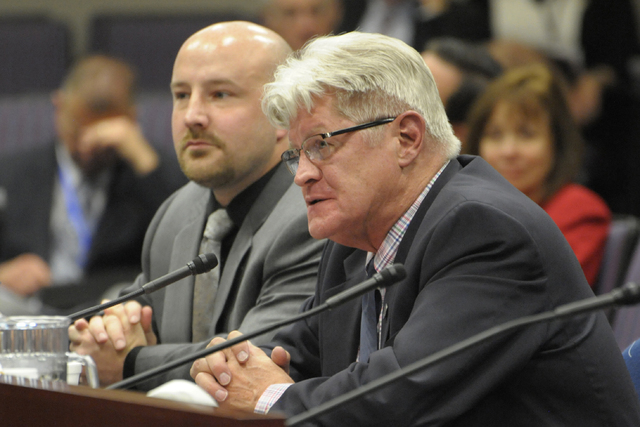Sandoval unveils $262 million compromise tax hike plan
CARSON CITY — Gov. Brian Sandoval unveiled a compromise tax plan Thursday, a blend of competing proposals floated in the Legislature that would raise $262 million a year to help fund his $7.4 billion budget.
The Nevada Revenue Plan melds concepts from Senate Bill 252, Sandoval’s initial business license fee overhaul, with components of Assembly Bill 464, crafted by Assembly Majority Leader Paul Anderson and Assemblyman Derek Armstrong, both Southern Nevada Republicans; and Senate Bill 374, introduced by state Sen. Pat Spearman, D-North Las Vegas.
“In the spirit of bipartisan compromise, I have put forth a revenue plan that incorporates the best thinking of our elected leaders and structurally changes our ability to meet the growing demands of our diverse state,” Sandoval said in a prepared statement.
The new plan comes with time running out in the legislative session. The Republican governor’s initial proposal to raise business license fees from $200 annually to a minimum $400 up to $4 million based on industry type and gross receipts was approved in the Senate 17-4 but hit a rock wall in the Assembly, leaving its fate very much in doubt.
Legislative leaders praised the compromise, though it still needs vetting in a persnickety legislative body.
Anderson complemented the governor for recognizing the efforts of leadership in the Assembly chamber.
“I have begun discussing it with our caucus members and I look forward to scheduling a full hearing in the next several days,” Anderson said.
Democratic leaders in the Senate and Assembly said they want to make sure any tax plan doesn’t cause financial harm to struggling small businesses and the middle class.
“I look forward to diving into the policy details of the forthcoming revenue plan to ensure that’s the case and I hope that we can find common ground in the remaining days of the session to support it,” said Assembly Democratic Minority Leader Marilyn Kirkpatrick, D-North Las Vegas.
Senate Minority Leader Aaron Ford, D-Las Vegas, echoed Kirkpatrick’s sentiments, adding that the goal is to implement a revenue structure “that will fund education, protect small businesses and allow Nevada to grow.”
With the June 1 deadline for the Legislature to adjourn rapidly approaching, Senate Majority Leader Michael Roberson, R-Henderson, said the new proposal “creates the necessary path toward completing the business of the state on time.”
The proposal still must be drafted into a bill and heard by the committees.
Administration officials said the elements combined in the proposal would broaden the state’s tax base, shield Nevada’s economy from volatility and allow an investment in education.
The measure has three prongs — business license fees, modified business taxes and a “commerce” tax based on industry type and revenue.
Annual business license fees would increase to $300 annually for most businesses, and to $500 for corporations.
Nevada’s modified business tax, or MBT, would rise to 1.475 percent for general businesses, up from the existing rate of 1.17 percent. Mining and financial institutions would pay a rate of 2 percent. Additionally the current exemption of the first $340,000 in annual payroll would be cut to $200,000, meaning more businesses would be subject to the levy that is assessed on payroll. Employers would retain a deduction for employer-paid health care expenses.
A new component is a commerce tax, the alternative to Sandoval’s graduated business license fee scheme. It’s an industry-specific tax that would be imposed on businesses with revenue of $3.5 million or more. But companies would be able to apply 50 percent of that tax as a credit against the modified business tax.
Administration officials said the industry categories will be whittled down somewhat from the original 30 in Sandoval’s initial business license fee plan.
According to an analysis of the tax plan, retail trade will account for about $31.6 million, or 12 percent of the $262 million total revenue anticipated. Non-employer operations and corporations registered in Nevada but do not conduct business here would generate nearly $29 million.
About $24 million would be generated from Nevada’s hotel industry, and $19 million from businesses in the professional services category.
Nevada’s independent Economic Forum this month projected the state could count on $6.15 billion in revenue under the existing tax structure over the upcoming two-year budget cycle, leaving a big gap between revenue and the governor’s spending plan that adds hundreds of millions of dollars to education.
Besides the new tax plan, Sandoval wants to make permanent other taxes that were imposed as a temporary measure in 2009 and twice extended to weather the Great Recession. Senate Bill 483 also raises the tax on cigarettes by $1 a pack. It was approved on a party-line vote earlier this month by the Senate Revenue Committee and is still in the legislative hopper.
That bill was estimated to generated about $800 million over the budget cycle, though it’s not yet clear how it will jibe with the newest tax blueprint announced Thursday.
Contact Sandra Chereb at schereb@reviewjournal.com or 775-687-3901. Find her on Twitter: @SandraChereb

RELATED STORIES
Labor wants all public contract details revealed in Nevada
Free speech advocates oppose bill to weaken Nevada’s SLAPP law
Assembly panel hears support for gun law reform bill
Bill calls for inventory of vested water rights in dry Nevada
Clark County Commissioners, Nevada lawmakers move to reform ‘appalling’ guardianship program
Sandoval’s key tax bill clears state Senate
See all of our coverage: 2015 Nevada Legislature.

















